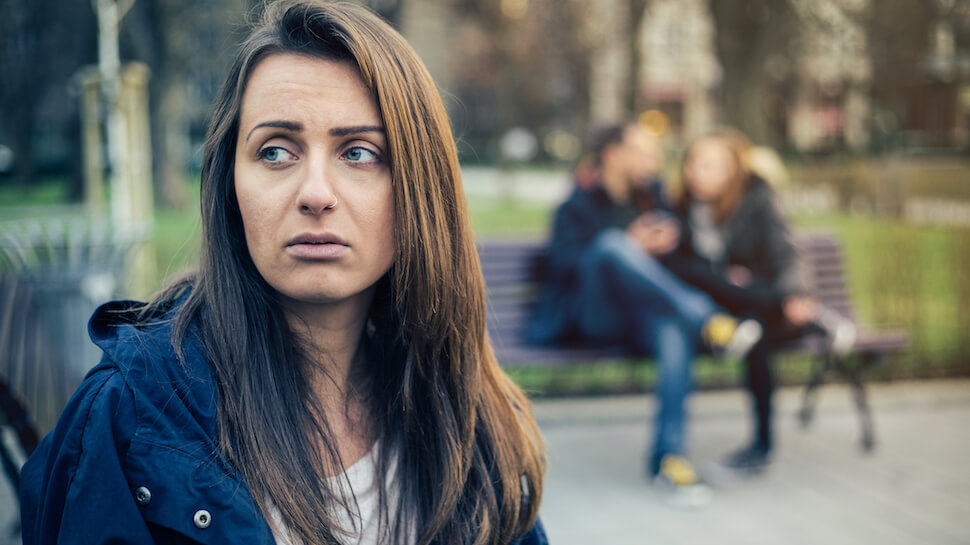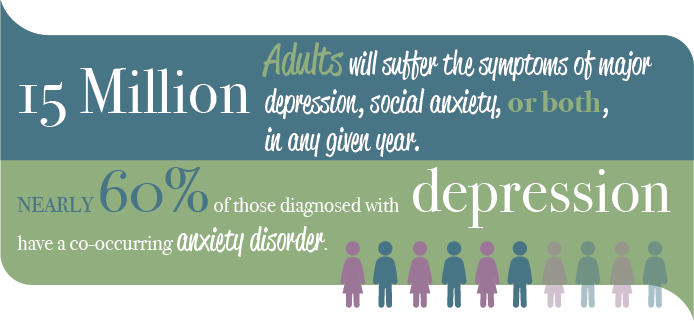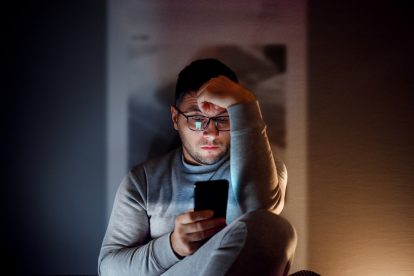
Social Anxiety and Depression
The symptoms of severe social anxiety and depression are disabling in their own unique ways. When the two disorders occur together—as they frequently do—life complications multiply and treatment requirements become more complex. A dual diagnosis for social anxiety disorder and depression will require an integrated treatment regimen that addresses all symptoms simultaneously, and as long as sufferers remain committed to their recovery their co-occurring conditions should become far more manageable over time.
Facts about Social Anxiety and Depression
Depression and social anxiety disorder are two of the most commonly diagnosed mental health conditions in the United States—and a significant number of people are familiar with the symptoms of both.
In comparison to the general public, people with severe social anxiety are six times more likely to develop a mood disorder (major depression, high-functioning depression, or bipolar disorder). Meanwhile, people diagnosed with depression have co-occurring anxiety disorders in nearly 60 percent of all cases, with social anxiety disorder being the most commonly diagnosed of these conditions.

Other statistics reveal more about the high prevalence of both social anxiety disorder and depression, and about the ways they are connected:
- The 12-month rate of incidence of social anxiety disorder in American adults is 6.8 percent, and its lifetime rate of incidence is 13.3 percent.
- The 12-month rate of incidence for major depression in American adults is 6.7 percent, and its lifetime rate of incidence is 16.2 percent.
- The 12-month rate of incidence of persistent depressive disorder (also known as high-functioning depression) in American adults is 1.5 percent, and its lifetime rate of incidence is 3.6 percent.
- In any given year in the United States, 15 million adults will suffer the symptoms of major depression, social anxiety disorder, or both. In addition, about 3.5 million people will experience the symptoms of high-functioning depression.
- In one study of social anxiety sufferers receiving outpatient treatment, 53 percent had experienced at least one episode of depression.
- Among people diagnosed with both major depression and any anxiety disorder, only 13.7 percent of lifetime sufferers experienced the symptoms of depression first, giving strength to the assertion that depression is one possible outcome of prolonged, untreated anxiety.
Signs and Symptoms of Social Anxiety and Depression
In many instances, people suffering from more than one mental health disorder will have trouble receiving an accurate diagnosis, since the symptoms of such conditions often overlap.
But depression and social anxiety disorder are distinct illnesses with differing symptoms, and not enough commonality for one to disguise the presence of the other. Social anxiety sufferers experiencing the onset of depression know that something has changed, and not for the better.
Social Anxiety Disorder Symptoms
Social anxiety disorder produces both physical and emotional/psychological symptoms, which may occur before, during, or immediately after social encounters. Social anxiety is sometimes referred to by the alternate label social phobia, which is appropriate given the depth and intensity of the fear that people with social anxiety disorder experience in most social situations.
The physical symptoms of social phobia clearly indicate the presence of strong anxiety, and they include:
- Rapid heartbeat
- Difficulty breathing
- Tightness or cramping of muscles
- Sweaty palms
- Lightheadedness
- Dry mouth
- Blushing
- Nausea
- Brain freeze (thinking is hindered, making it hard to think or speak)
The emotional and psychological symptoms of social anxiety include:
- Anticipatory anxiety (feeling nervous before an anticipated encounter)
- Fear of being rejected, embarrassed, or humiliated during social interactions
- Low self-esteem and lack of self-confidence
- Feelings of weakness, guilt, and shame because of past social failures
- A strong compulsion to avoid social situations that seem threatening
- Constant second-guessing and self-criticism over performance
Depression Symptoms
While social anxiety symptoms are periodic and situation-specific, depression is a pervasive disorder that directly affects mood on a daily basis. Depression makes it nearly impossible for sufferers to enjoy any activities, including those they might have looked forward to in the past.
Common signs of depression include:
- Feelings of emptiness
- Loss of motivation
- Dull and deadened emotions
- Lethargy, or lack of energy
- No interest in formerly pleasurable activities
- Poor focus and concentration
- Changes in sleep patterns
- Changes in eating habits
- Despair, or feelings of hopelessness
- Suicidal thoughts or actions
Why Do People with Social Anxiety Become Depressed?
Social phobia symptoms often prevent people with social anxiety from making friends, pursuing romantic relationships, applying for jobs they want, speaking up for themselves if they’ve been mistreated, volunteering with organizations that support causes they care about, or doing a thousand other things they’d like to do if not for the overwhelming nature of their social anxiety.
In these circumstances, the onset of depression is a predictable outcome.
If a person experiences the worst social phobia symptoms for an extended period, their frustration, disappointment, and feelings of helplessness can push them to the breaking point. After years of feeling bad, they may finally stop feeling anything at all. The depression functions almost like a protective mechanism, taking the edge off emotions that are too painful to bear for any longer.
There are several factors involved with severe social anxiety that may make social anxiety disorder sufferers vulnerable to depression:
- Social isolation and a lack of contact with people. Social anxiety sufferers are not isolated and alone by choice. It is only their disabling social phobia symptoms that prohibit them from reaching out to others.
- Persistent feelings of shame. Their avoidant behavior makes social anxiety sufferers feel ashamed and weak. They see their avoidance of social situations as a sign of inferiority, not as a reasonable coping method for dealing with frightening emotions.
- Chronic inactivity. Social phobia sufferers tend to stay in their homes for excessive periods of time. This reduces their stressful exposures, but their inactive lifestyles leave them feeling bored and empty, putting them at risk for depression. To escape their feelings of emptiness, they may watch television or mindlessly browse the Internet for many hours each day, but that only drains their energy even more and leaves them feeling listless and lifeless.
- Endless frustration over a lack of achievements. People with severe social anxiety have dreams and ambitions like everyone else. But their disorder limits their ability to pursue those dreams and prevents them from reaching their full potential.
- Bad experiences with other people. People who openly exhibit the signs of social anxiety are sometimes teased, bullied, demeaned, rejected, or ignored. Unfortunately, experiences such as these only reinforce the fears of social anxiety sufferers, feeding negative emotions that can eventually transform into depression.
- Alterations in brain activity and structure. While social anxiety and depression produce different symptoms, they both emerge out of similar variations in brain structure. People with social anxiety disorder and depression both suffer from hyperactivity in the amygdala, the part of the brain responsible for basic emotions and reactions to external threats. By contrast, the prefrontal cortex, an area of the brain associated with rational thought that is supposed to counteract excessive anxiety responses, does not function properly in the brains of either social anxiety or depression sufferers.
While depression and social anxiety may develop independently in some cases, most social anxiety disorder sufferers recognize depression as a response to unhappy life circumstances.
Call for a Free Confidential Assessment.
877-727-4343Treatment for Co-occurring Social Anxiety Disorder and Depression
Social anxiety disorder and depression are persistent conditions that produce overpowering, life-altering symptoms. But both disorders are highly responsive to treatment, and that does not change when both are present simultaneously as co-occurring disorders.
Dual diagnosis treatment programs for severe social anxiety and either major or high-functioning depression usually include the following elements:
- Psychotherapy (individual and group). Cognitive-behavioral therapy (CBT), psychodynamic therapy, and eye movement desensitization and reprocessing (EMDR) are some of the therapies commonly used to treat social anxiety, and all are effective against the symptoms of depression as well. Group therapy sessions for social anxiety sufferers are kept intentionally small, to make everyone feels as secure and comfortable as possible.
- Medication. There are several antidepressant medications that can help reduce or eliminate social phobia symptoms as well as the symptoms of depression. This is possible because each condition produces similar chemical imbalances in the brain, in response to aberrations in brain structure and functioning that are risk factors for both disorders.
- Life skills training and education. Social anxiety sufferers need practice to develop better social skills (and more self-confidence). People with both social anxiety disorder and depression can gain greater self-understanding and self-acceptance by learning more about the nature of their conditions.
- Lifestyle changes. Better nutrition, more exercise, and regular sleep can all help counteract the symptoms of depression. They also bring much-needed positive energy and a sense of accomplishment to those feeling oppressed by the symptoms of severe social anxiety.
- Holistic therapies and healthcare practices. Activities like meditation, acupuncture, yoga, massage therapy, equine therapy, art and music therapy, and other mind-body techniques can help social anxiety sufferers manage anxiety and people with depression balance their moods.
Men and women with co-occurring depression and social anxiety disorder should begin treatment in a residential mental health treatment center, where all the programs and services they need are available on a round-the-clock basis. Eventually they will transition to outpatient care, but in the early stages of treatment a full-time focus on recovery will produce the most dramatic and sustainable results.
As long as men and women with a dual diagnosis for social anxiety and depression follow their recovery routines faithfully, and continue to consult with mental health professionals about any changes in their conditions, their prospects for long-term recovery are excellent. Social anxiety and depression are difficult to manage without expert help, but with high-quality treatment those who’ve suffered from both can finally get their lives back on track.





